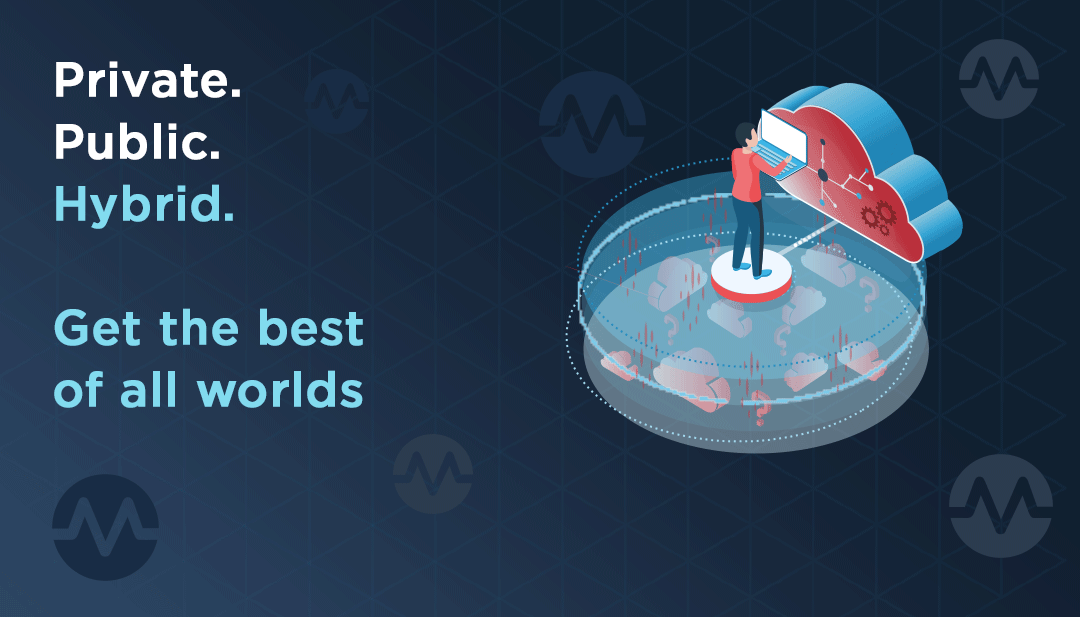Cloud computing allows on-demand self-service access to elastic and scalable infrastructures. With cloud computing, organizations can enjoy the benefits of a more flexible and adaptable approach to IT costs. However, without the right governance, public cloud costs can quickly get out of control.
On-prem private clouds have recently had a renewed interest as enterprises see the opportunity to take the learning from AWS, Azure, and GCP and apply it to hypervisors such as VMware and Nutanix to reduce cost and improve security. This dynamic is why Hybrid Cloud has become the de facto standard.
While some like to refer to the cloud as a singular entity, the reality is that there are several different types of cloud. Clouds are defined by how resources on the cloud are shared, who has access to the cloud, and where resources on the cloud are located. Traditionally, the two most common categories of cloud-computing platforms are public cloud and private cloud, so what is the difference between private cloud vs public cloud?
Here, we discuss Private Cloud vs. Public Cloud — their differences, benefits, and how a hybrid solution can offer the best of both worlds.
Private Cloud vs. Public Cloud: House or Apartment?
One of the easiest ways to visualize the differences between private cloud vs public cloud is the analogy of renting an apartment vs. purchasing a house.
When you buy a house, you enjoy a private, personalized space that you own. Your home belongs to you; you set the rules, but you are also primarily responsible for maintenance and upkeep.
On the other hand, when you rent an apartment you are paying for the privilege to use someone else’s property. Rather than set your own rules, you abide by the rules outlined in your rental contract. Additionally, you share a portion of your living space, such as common areas and laundry facilities, with others in your building. However, your landlord is responsible for most maintenance, repair, and upkeep.
Each housing option offers certain benefits and drawbacks, and either might be the right solution for specific individuals or circumstances. Similarly, the same is true for private cloud vs. public cloud computing.
Private Cloud
What defines a private cloud isn’t the location of the hardware; it’s the data stored on the hardware and who has access to it. The private cloud is an exclusive, dedicated environment designed to provide for a single organization.
Businesses that use a private cloud most often own that private cloud. Owning a private cloud means taking responsibilities associated with infrastructure, applications, and security. While many private-cloud servers are built and maintained on-premises, data-center resources may also be hosted off-site by third-party vendors, some of which will also manage the care and feeding.
Just as owning a house allows for personalization, private-cloud solutions mean improved customization, optimal flexibility, and guaranteed compatibility. And, because the private cloud solution is fully dedicated, you get control over security across applications and data. This control is especially important for businesses held to rigorous regulatory and compliance mandates.
Are there downsides to a private cloud? Sure. For one thing, creating and maintaining a dedicated private cloud can mean upfront costs and an increased burden on IT departments. However, many hardware providers like HPE, Dell, and Lenovo have flexible finance programs and external service providers who offer managed private cloud services.
Public Cloud
When you use a public cloud like AWS or Azure, you are renting a slice of infrastructure and sharing the underlying computing and storage with other organizations. Like an apartment, the public cloud establishes terms of use and allows users to operate within those terms and access valuable resources via the internet. Public clouds are owned by the provider, who also manages the associated hardware. However, there is still a shared responsibility for securing and patching applications and data running in IaaS environments within a public cloud.
Although a public cloud infrastructure is shared, users can only access their instances and data, just as apartment residents only have access to their unit. Sensitive information and applications remain invisible to other customers using the public cloud.
Most public cloud solutions are easily managed without the need for extensive IT experience. Additionally, because all repairs and maintenance fall to the cloud vendor, users can operate knowing that any outages are minimal or likely to be resolved quickly.
On the other hand, while most public cloud providers heavily invest in protecting their customers’ sensitive data, this lack of direct control may mean increased liability issues for certain businesses. At the same time, data spikes within a public cloud may lead to decreased performance. And in terms of price, it’s commonly recognized that public cloud is not less expensive at scale. Additionally, many enterprises have horror stories of surprise bills due to a lack of governance.

A Hybrid Cloud Solution
Why choose private cloud vs. public cloud? When faced with the choice between private-cloud and public-cloud computing, many businesses take the third option to get the best of both: Hybrid cloud.
Hybrid cloud takes on-site or hosted private-cloud instances supplemented by public-cloud services. Ideally, the hybrid cloud should function as a single infrastructure, seamlessly combining private and public functions, to better protect and manage sensitive data and applications while also allowing for increased innovation and scalability at cost. Simply put, you can own the base and rent the spike, solving the private cloud vs. public cloud debate.
However, as hybrid cloud is a blend of multiple private and public cloud options, the need for consistent and consolidated hybrid cloud management is on the rise. Morpheus Data brings the public cloud experience on-prem to use your own infrastructure. Additionally, Morpheus extends on-prem control and security to AWS, Azure, GCP, and others. The Morpheus platform offers advanced hybrid cloud management and infrastructure automation, allowing businesses to enable private cloud while also controlling public cloud access. It is a single interface that abstracts the underlying cloud accounts so you don’t have to be an expert in VMware, AWS, Azure, and GCP to access the advantages of those platforms.
Morpheus frees up teams with the resources they need to do their jobs more effectively and with more freedom. Mix and match essential private- and public-cloud technologies, and integrate with existing tools, like Ansible, ServiceNow, Terraform, and more. The result? A fast and reliable option for combining the best of both cloud-platform worlds.
Interested in learning more? Check out the demo request page, and see exactly how an automated hybrid solution can bring the future of cloud technology to your business.
